Criminology and Criminal Justice: Actus Reus, Mens Rea & Inchoate
VerifiedAdded on 2023/04/23
|5
|896
|145
Discussion Board Post
AI Summary
This discussion explores the fields of criminology and criminal justice, highlighting their similarities and differences, and examines the increasing role of criminology in criminal justice. It delves into the scientific methods used in criminology, such as forensic analysis and psychology, and their application in law enforcement, courts, and corrections. The discussion also analyzes a scenario involving potential criminal acts, focusing on the elements of actus reus, mens rea, and inchoate offenses, providing legal definitions and context. Furthermore, it differentiates between acts that violate criminal law and those that do not, emphasizing the importance of proving both actus reus and mens rea beyond reasonable doubt. This assignment solution is available on Desklib, a platform offering a range of study tools for students.
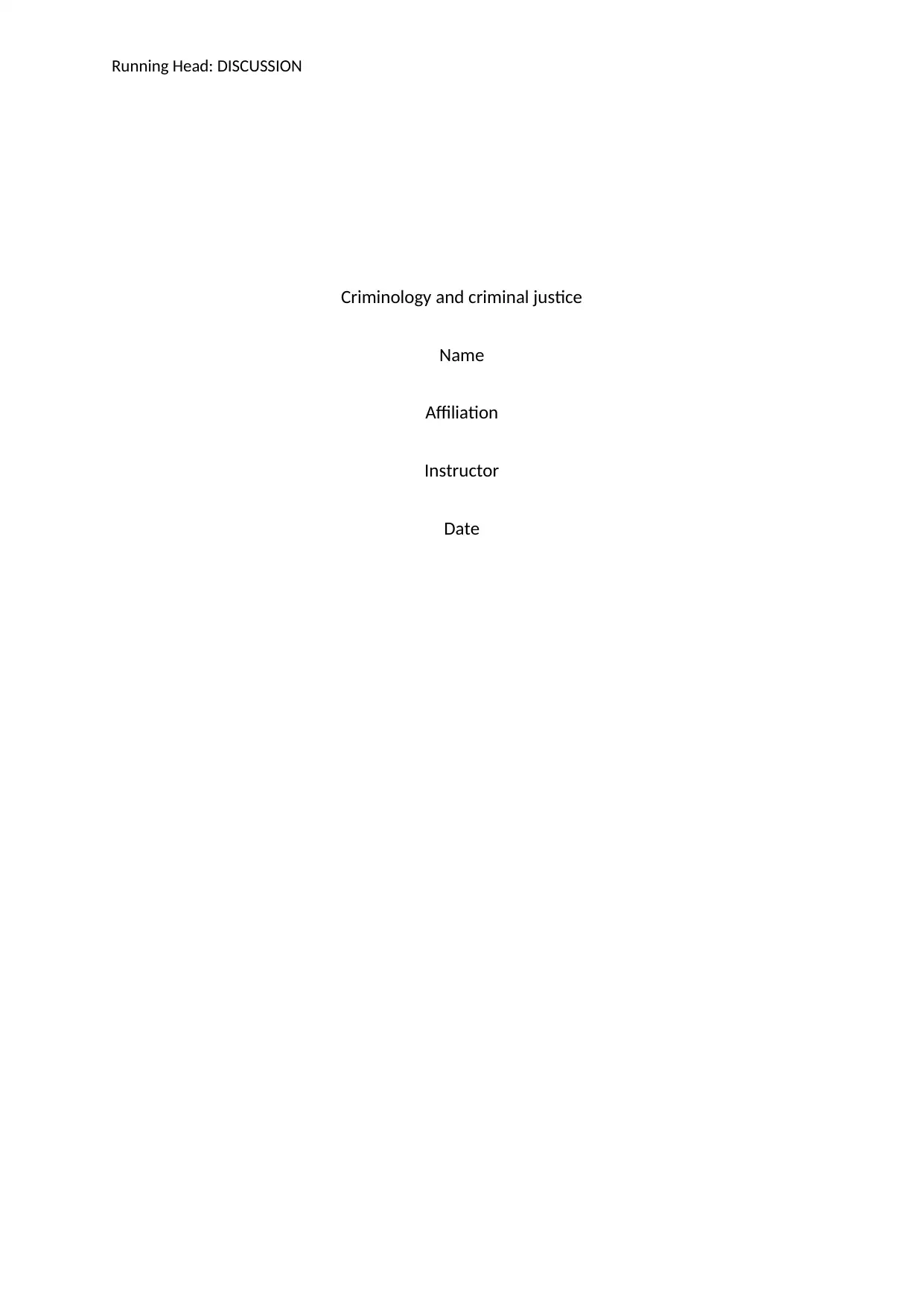
Running Head: DISCUSSION
Criminology and criminal justice
Name
Affiliation
Instructor
Date
Criminology and criminal justice
Name
Affiliation
Instructor
Date
Paraphrase This Document
Need a fresh take? Get an instant paraphrase of this document with our AI Paraphraser
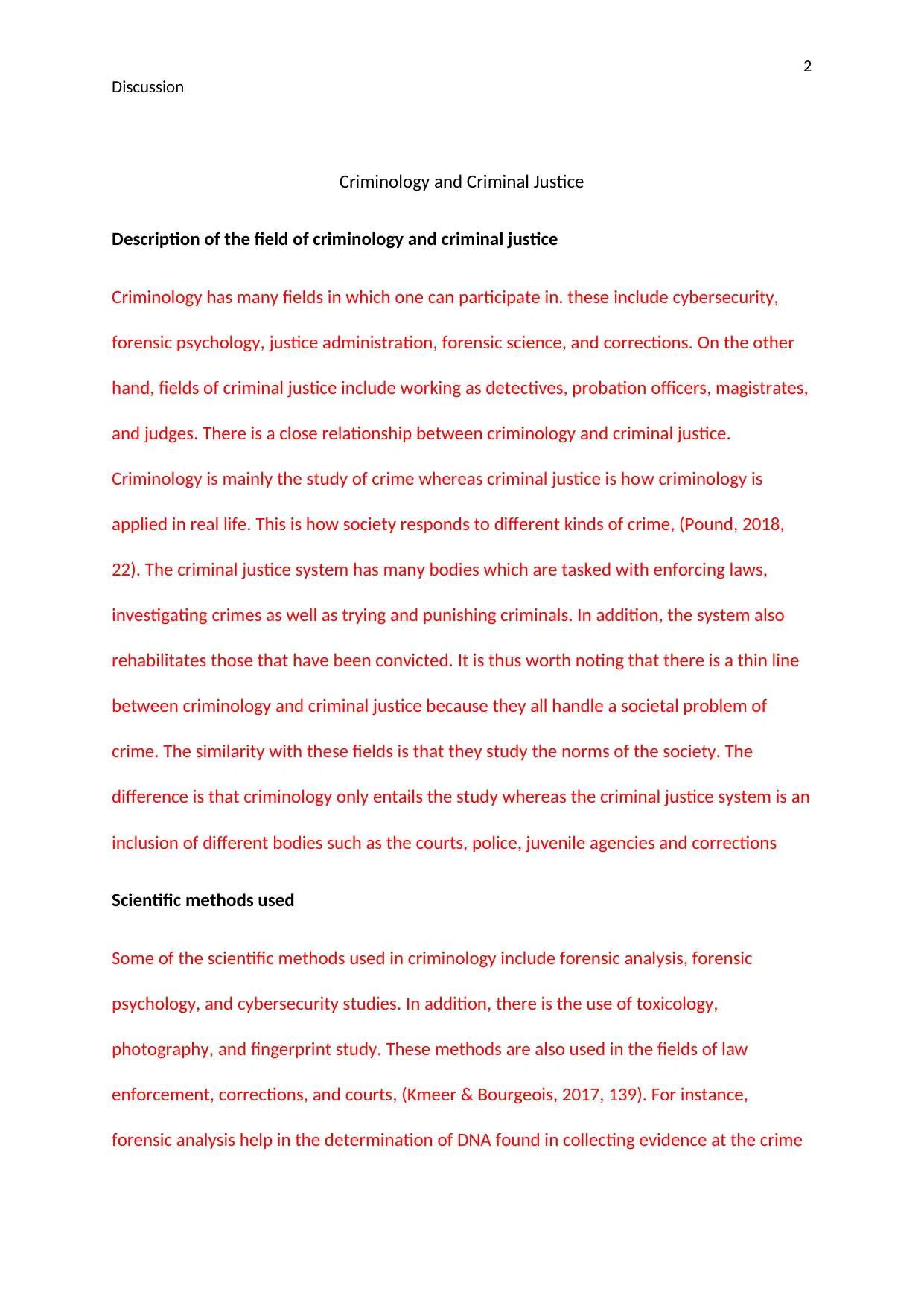
2
Discussion
Criminology and Criminal Justice
Description of the field of criminology and criminal justice
Criminology has many fields in which one can participate in. these include cybersecurity,
forensic psychology, justice administration, forensic science, and corrections. On the other
hand, fields of criminal justice include working as detectives, probation officers, magistrates,
and judges. There is a close relationship between criminology and criminal justice.
Criminology is mainly the study of crime whereas criminal justice is how criminology is
applied in real life. This is how society responds to different kinds of crime, (Pound, 2018,
22). The criminal justice system has many bodies which are tasked with enforcing laws,
investigating crimes as well as trying and punishing criminals. In addition, the system also
rehabilitates those that have been convicted. It is thus worth noting that there is a thin line
between criminology and criminal justice because they all handle a societal problem of
crime. The similarity with these fields is that they study the norms of the society. The
difference is that criminology only entails the study whereas the criminal justice system is an
inclusion of different bodies such as the courts, police, juvenile agencies and corrections
Scientific methods used
Some of the scientific methods used in criminology include forensic analysis, forensic
psychology, and cybersecurity studies. In addition, there is the use of toxicology,
photography, and fingerprint study. These methods are also used in the fields of law
enforcement, corrections, and courts, (Kmeer & Bourgeois, 2017, 139). For instance,
forensic analysis help in the determination of DNA found in collecting evidence at the crime
Discussion
Criminology and Criminal Justice
Description of the field of criminology and criminal justice
Criminology has many fields in which one can participate in. these include cybersecurity,
forensic psychology, justice administration, forensic science, and corrections. On the other
hand, fields of criminal justice include working as detectives, probation officers, magistrates,
and judges. There is a close relationship between criminology and criminal justice.
Criminology is mainly the study of crime whereas criminal justice is how criminology is
applied in real life. This is how society responds to different kinds of crime, (Pound, 2018,
22). The criminal justice system has many bodies which are tasked with enforcing laws,
investigating crimes as well as trying and punishing criminals. In addition, the system also
rehabilitates those that have been convicted. It is thus worth noting that there is a thin line
between criminology and criminal justice because they all handle a societal problem of
crime. The similarity with these fields is that they study the norms of the society. The
difference is that criminology only entails the study whereas the criminal justice system is an
inclusion of different bodies such as the courts, police, juvenile agencies and corrections
Scientific methods used
Some of the scientific methods used in criminology include forensic analysis, forensic
psychology, and cybersecurity studies. In addition, there is the use of toxicology,
photography, and fingerprint study. These methods are also used in the fields of law
enforcement, corrections, and courts, (Kmeer & Bourgeois, 2017, 139). For instance,
forensic analysis help in the determination of DNA found in collecting evidence at the crime
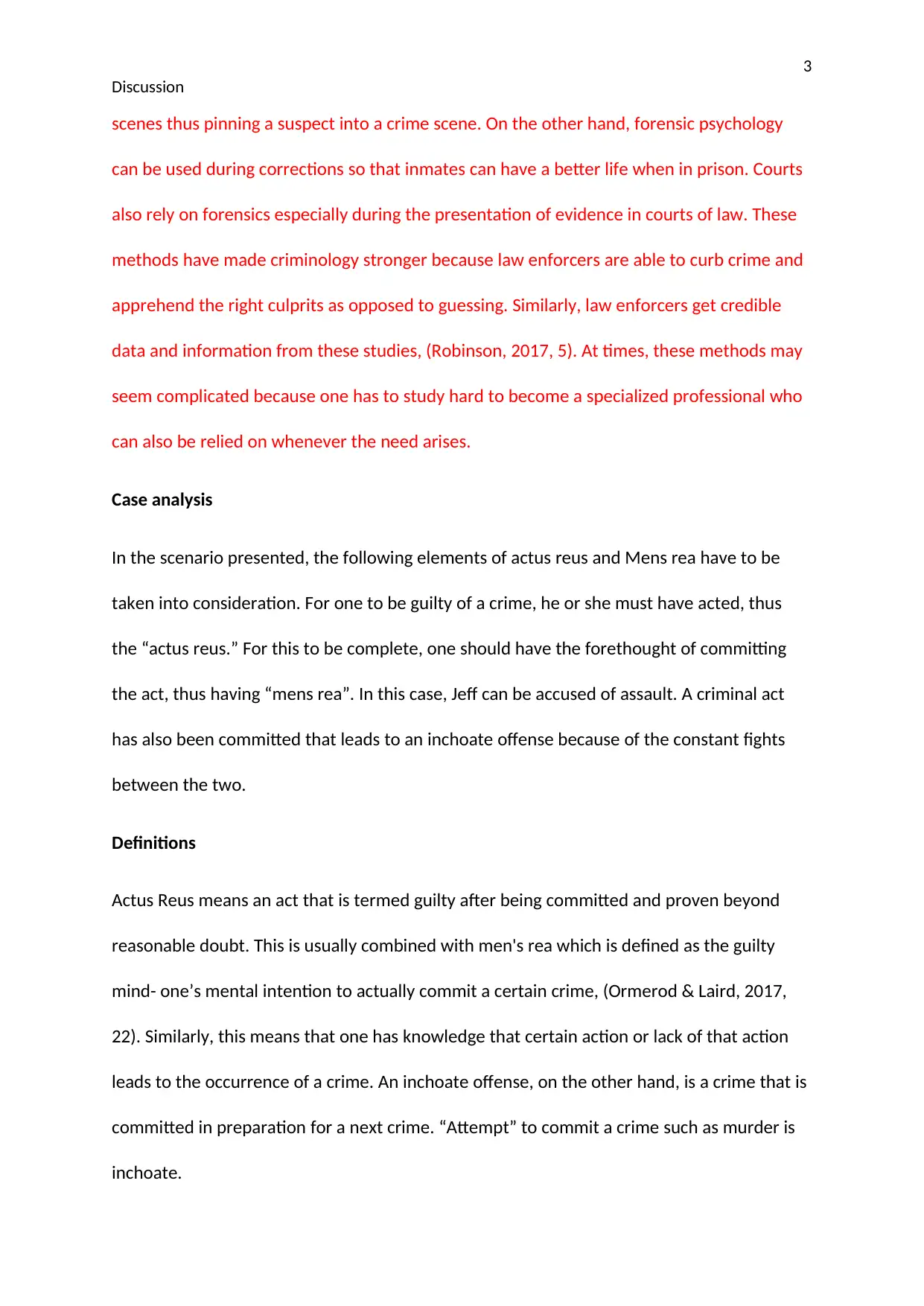
3
Discussion
scenes thus pinning a suspect into a crime scene. On the other hand, forensic psychology
can be used during corrections so that inmates can have a better life when in prison. Courts
also rely on forensics especially during the presentation of evidence in courts of law. These
methods have made criminology stronger because law enforcers are able to curb crime and
apprehend the right culprits as opposed to guessing. Similarly, law enforcers get credible
data and information from these studies, (Robinson, 2017, 5). At times, these methods may
seem complicated because one has to study hard to become a specialized professional who
can also be relied on whenever the need arises.
Case analysis
In the scenario presented, the following elements of actus reus and Mens rea have to be
taken into consideration. For one to be guilty of a crime, he or she must have acted, thus
the “actus reus.” For this to be complete, one should have the forethought of committing
the act, thus having “mens rea”. In this case, Jeff can be accused of assault. A criminal act
has also been committed that leads to an inchoate offense because of the constant fights
between the two.
Definitions
Actus Reus means an act that is termed guilty after being committed and proven beyond
reasonable doubt. This is usually combined with men's rea which is defined as the guilty
mind- one’s mental intention to actually commit a certain crime, (Ormerod & Laird, 2017,
22). Similarly, this means that one has knowledge that certain action or lack of that action
leads to the occurrence of a crime. An inchoate offense, on the other hand, is a crime that is
committed in preparation for a next crime. “Attempt” to commit a crime such as murder is
inchoate.
Discussion
scenes thus pinning a suspect into a crime scene. On the other hand, forensic psychology
can be used during corrections so that inmates can have a better life when in prison. Courts
also rely on forensics especially during the presentation of evidence in courts of law. These
methods have made criminology stronger because law enforcers are able to curb crime and
apprehend the right culprits as opposed to guessing. Similarly, law enforcers get credible
data and information from these studies, (Robinson, 2017, 5). At times, these methods may
seem complicated because one has to study hard to become a specialized professional who
can also be relied on whenever the need arises.
Case analysis
In the scenario presented, the following elements of actus reus and Mens rea have to be
taken into consideration. For one to be guilty of a crime, he or she must have acted, thus
the “actus reus.” For this to be complete, one should have the forethought of committing
the act, thus having “mens rea”. In this case, Jeff can be accused of assault. A criminal act
has also been committed that leads to an inchoate offense because of the constant fights
between the two.
Definitions
Actus Reus means an act that is termed guilty after being committed and proven beyond
reasonable doubt. This is usually combined with men's rea which is defined as the guilty
mind- one’s mental intention to actually commit a certain crime, (Ormerod & Laird, 2017,
22). Similarly, this means that one has knowledge that certain action or lack of that action
leads to the occurrence of a crime. An inchoate offense, on the other hand, is a crime that is
committed in preparation for a next crime. “Attempt” to commit a crime such as murder is
inchoate.
⊘ This is a preview!⊘
Do you want full access?
Subscribe today to unlock all pages.

Trusted by 1+ million students worldwide
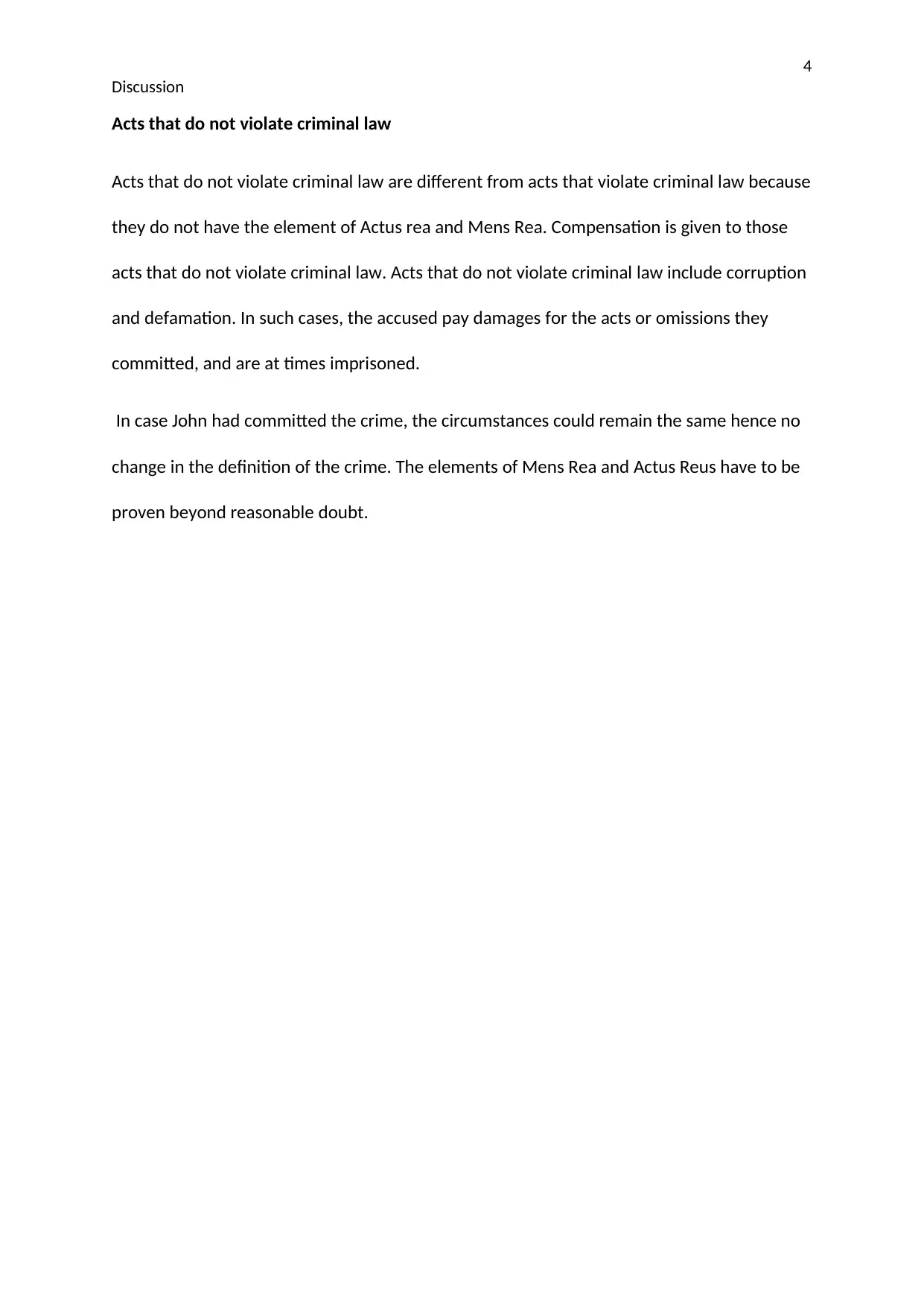
4
Discussion
Acts that do not violate criminal law
Acts that do not violate criminal law are different from acts that violate criminal law because
they do not have the element of Actus rea and Mens Rea. Compensation is given to those
acts that do not violate criminal law. Acts that do not violate criminal law include corruption
and defamation. In such cases, the accused pay damages for the acts or omissions they
committed, and are at times imprisoned.
In case John had committed the crime, the circumstances could remain the same hence no
change in the definition of the crime. The elements of Mens Rea and Actus Reus have to be
proven beyond reasonable doubt.
Discussion
Acts that do not violate criminal law
Acts that do not violate criminal law are different from acts that violate criminal law because
they do not have the element of Actus rea and Mens Rea. Compensation is given to those
acts that do not violate criminal law. Acts that do not violate criminal law include corruption
and defamation. In such cases, the accused pay damages for the acts or omissions they
committed, and are at times imprisoned.
In case John had committed the crime, the circumstances could remain the same hence no
change in the definition of the crime. The elements of Mens Rea and Actus Reus have to be
proven beyond reasonable doubt.
Paraphrase This Document
Need a fresh take? Get an instant paraphrase of this document with our AI Paraphraser
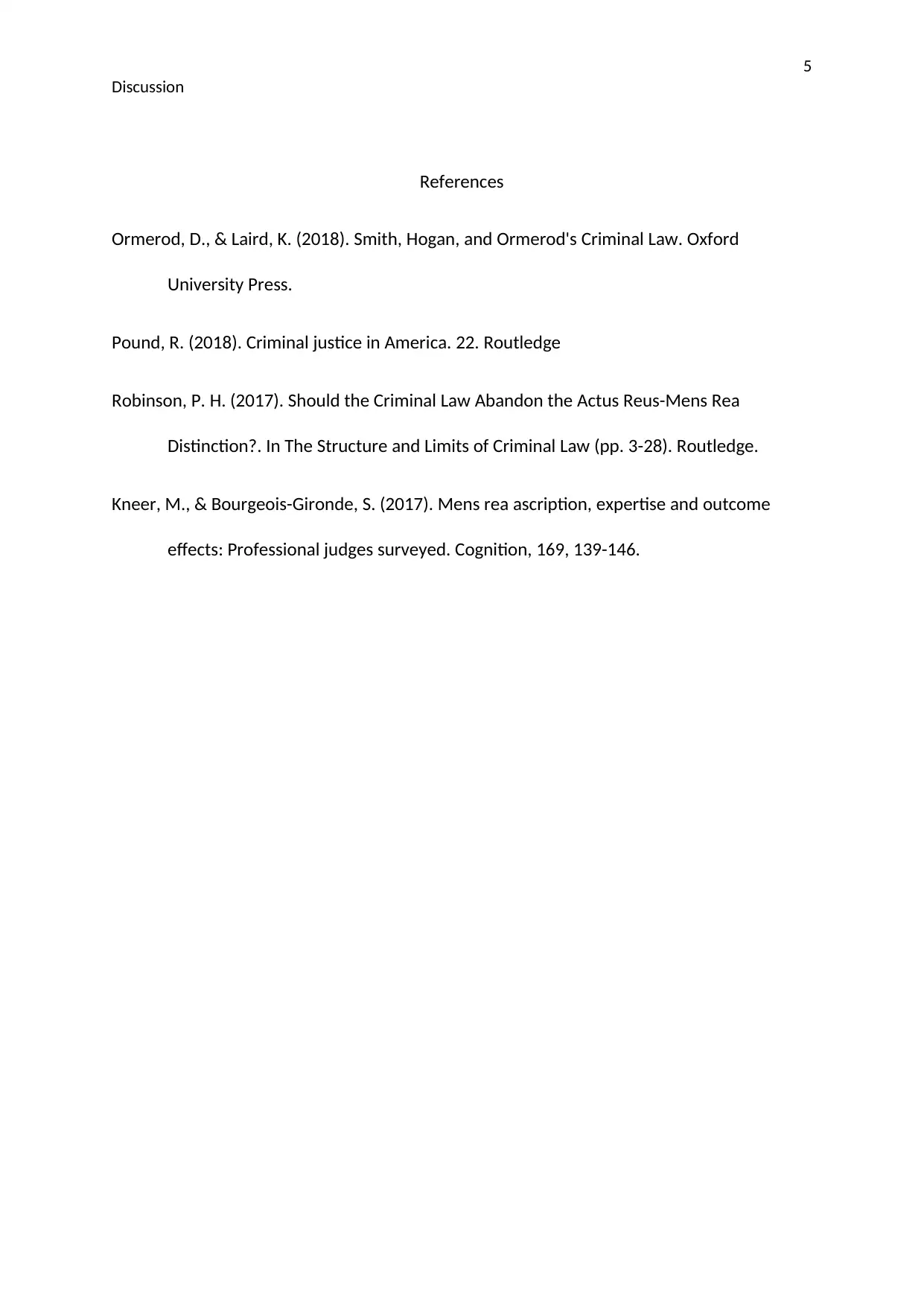
5
Discussion
References
Ormerod, D., & Laird, K. (2018). Smith, Hogan, and Ormerod's Criminal Law. Oxford
University Press.
Pound, R. (2018). Criminal justice in America. 22. Routledge
Robinson, P. H. (2017). Should the Criminal Law Abandon the Actus Reus-Mens Rea
Distinction?. In The Structure and Limits of Criminal Law (pp. 3-28). Routledge.
Kneer, M., & Bourgeois-Gironde, S. (2017). Mens rea ascription, expertise and outcome
effects: Professional judges surveyed. Cognition, 169, 139-146.
Discussion
References
Ormerod, D., & Laird, K. (2018). Smith, Hogan, and Ormerod's Criminal Law. Oxford
University Press.
Pound, R. (2018). Criminal justice in America. 22. Routledge
Robinson, P. H. (2017). Should the Criminal Law Abandon the Actus Reus-Mens Rea
Distinction?. In The Structure and Limits of Criminal Law (pp. 3-28). Routledge.
Kneer, M., & Bourgeois-Gironde, S. (2017). Mens rea ascription, expertise and outcome
effects: Professional judges surveyed. Cognition, 169, 139-146.
1 out of 5
Related Documents
Your All-in-One AI-Powered Toolkit for Academic Success.
+13062052269
info@desklib.com
Available 24*7 on WhatsApp / Email
![[object Object]](/_next/static/media/star-bottom.7253800d.svg)
Unlock your academic potential
Copyright © 2020–2026 A2Z Services. All Rights Reserved. Developed and managed by ZUCOL.





